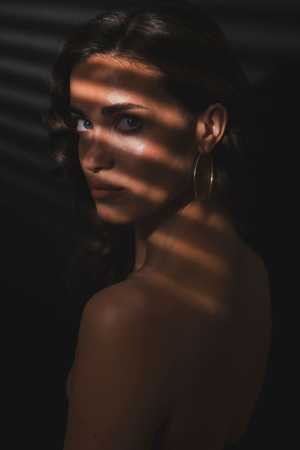If Genevieve Chenneour didn't exist you hope somebody would be able to invent her. A former artistic swimmer, she represented Team GB in two world championships before injury curtailed her career ahead of the 2016 Rio Olympics. Having dropped out of school to pursue swimming, she studied sports science, modelled, and worked on a stroke ward before gravitating to acting, landing the role of Clara Livingston in season three of Bridgerton. She even does stunts on the side.
She belongs to a family of soldiers and spies; her father is a British Army officer, her grandfather worked for MI5. Her first name comes from a 1953 comedy about a motor car. She writes essays on her Substack, and poetry on her phone. She’s an expert horse rider, a skilled amateur boxer and a crack shot with a pistol. It’s a biography straight out of an airport thriller: you can easily imagine her as a private detective in 1920s London, breaking hearts and solving murders while sporting an array of very chic hats.
“I've always found it really weird that you have to choose one thing to be taken seriously,” she says half an hour into our interview. “It's like, God forbid you need to shit and pee.”
Earlier this year, she became headline news when she fought off an attempted mugging at Joe & the Juice. A teenage thief grabbed her phone, only for Genevieve and her then-boyfriend to leap up and restrain him. The CCTV footage went viral, the media couldn’t get enough of her. Then she broke up with her boyfriend and temporarily left London. Even by her standards, it’s been an eventful few months.
I lost a lot of stuff overnight. My whole life changed
“I feel like I've been on a 27-year train of surviving. I was going from modelling jobs to modelling jobs, to auditions, castings.” She compares her life to a washing machine, spinning round and round, all perpetual motion, discombobulation. “Change, change, change, change, change,” as she describes it. “I've had an insane life. Insane life.”
On her Substack, The Naked Pages, she wrote in a recent post: “I was desperate to get off the rollercoaster I’d been on my entire life. Military family. Six schools. Identical twin. Five brothers. Team GB at 15. Career-ending injury. Stunt doubling. Family breaking apart. Modelling. Men who diminished me. Acting. And now this phone theft incident – no longer belonging in London, the only place I called home.”
I read the quote aloud to her in the cafe. “That's not even my whole story,” she says. “My dad disappeared, walked out six years ago. Family home got sold. My mum had to start again. I lost a lot of stuff overnight. My whole life changed.”

We meet in Notting Hill on an afternoon of tube strikes and incessant rain. I manage to miss my train and arrive at the designated pub embarrassingly late. Fortunately Chenneour does the decent thing and arrives even later, having been stranded at a bus stop across town. The minutes passed, the bus refused to materialise. An increasingly stressed Chenneour turned to her fellow travellers and inquired, “is anyone here going to Notting Hill?” Laughing, she recounts: “And everyone gave me this death stare!”
She has a brilliant laugh, head thrown back, fully capitalised: “HA HA HA!” I hear it again when she slips on the wet pavement and nearly falls flat on her face. “That would be typical for today!” We’re on the move, having decided we were sceptical of the pub’s acoustics and lack of coffee. A cafe and another pub are rejected before we stumble upon Dishoom Permit Room on Portobello Road, right across from Happy Sock Shop UK. “A whole shop just for socks,” says Chenneour with considerable scepticism.
Chenneour has a rare gift for rapport – twenty minutes in her company and I feel like I’ve known her for years. When she speaks, it’s often a mixture of philosophical musing or grinning like she’s about to impart the best piece of gossip you’ve ever heard. We chat a little about journalism; she recently wrote a piece entitled ‘I filmed a sex scene’. She tries to show me, only to discover it has vanished from her phone. An early draft is located but the final version proves elusive.
“Oh fucking shit,” she says in a manner straight out of a Richard Curtis film. (Well, we are in Notting Hill.) “Now I'm just typing ‘sex’ into my phone.” Eventually she locates an early draft, which she later emails to me. It begins thus:
“I filmed a sex scene.
Yeah, you heard that right – butt naked, bent over, fucking.
Was it necessary to the story?
To my ex-partner’s dismay, yes. More than necessary.
It wasn’t a soft-focus love scene; it was the pivot of a film about toxic masculinity.
And I’m proud of that. Because what it captured wasn’t fantasy – it was reality.”
Let's talk swimming. Although she discovered the sport at 13, a childhood of ballet and gymnastics – she represented Oxford – proved perfect grounding for the water. Her father worked on a local military base, accessible to army brats. (Today, they're no longer in touch.) There were helipads, guns, stables – and a pool. “I used to love the pool, I loved playing there. I remember seeing a video of synchronised swimming on the TV and I was like, ‘that looks like everything.’
It all happened very fast: one moment she’s taking her first lesson, the next she’s representing Team GB. She had the talent, and the dedication, dropping out of school aged 15. Training started at 5am and finished 12 hours later. Go back, eat, sleep, rinse, repeat. Life became a perpetual world tour: California, Tokyo, Russia, Spain, New York. On and on, round and round.
Did you enjoy it? She hesitates. “I think it's exciting, but when you are that young, you don't know yourself enough to really understand your feelings. Like every teenager. It was an incredible life experience, but I did enjoy parts of it. But it's not normal life.” Adolescence is a messy, chaotic business – but not hers. “I was told what to eat, I was told what to wear. I was told when I go to the bathroom. I was told to be perfect.”
After leaving the sport, “it took me years to figure out who I am. That's probably why I write – because I get to use my voice and figure it out as I go.” She writes from a place of total vulnerability. “I’m very open,” she says. “I don't believe in the concept of shame.”
How so?” “It's not yours, it's somebody else's voice that you heard, or you are preempting somebody else's judgement about how you'll be perceived. If you get rid of that, you wouldn't feel it. So it's not actually yours. You don't need to carry it… You can't really create art and achieve your dreams if you are living in that state. I just don't believe in it.”
It’s not merely rejecting shame; it’s learning how to let go. As Chenneour notes, “I've been through enough that I just don't give a fuck. I think you have to go through caring so much that you feel like it's going to break you to realise that's not sustainable. Fuck that. I'm not going to do it at all.”

After receiving an Olympic scholarship, everything looked set. A few months before Rio 2016, Chenneour tore a cartilage in her left hip, preventing any chance of competiting. How did she feel? “I was so tired. I was so exhausted. So overtrained. Everybody who has a dream, you also have a doubt. The chance of achieving that dream is probably smaller than the chance of not achieving it. So I was prepared to not achieve it as well.”
Was the dream a gold medal? “No, no, just going to the Olympics. The Olympics is a media frenzy. It's not a true world ranking. Not every country gets to compete, so it's not actually a world ranking. It's not world championships. I've always found it very odd how much people care about the Olympics. I never really understood it.” Did she care? “I didn't really care that much. I went to world championships. That's so much better.”
She retired at 18. No qualifications. No support from British Swimming. Her future was an empty horizon. Rather than allowing herself to drift, she completed her A-levels, enrolled in a sports science course and studied physiotherapy. She took boxing classes, and trained with the England Pistol Talent squad but found shooting targets incredibly boring compared to synchronised swimming, which she describes as “physical theatre.”
On swimming: “I didn't love it because of the athleticism. I didn't love it because of the perfectionist stuff. I loved it because it was a physical expression of myself. There was music and it was a performance and it was captivating and it was narrative. There is a narrative to synchronised swimming. If you learn enough about the sport, you'll realise the costumes, the makeup, the choreography, the music – everything about it is a story.”
And so she found other stories, working as a stunt performer and an extra on various film and TV productions. One of her first jobs involved working with Ted Lasso star Hannah Waddingham. “I was so impressed by her, the way she treated everyone around her. It was so nice. She's the perfect example of a woman that supports women.”
Chenneour played a jogger, running along the background of the shot while Waddingham said her lines. Take after take, run and reset, like someone doing a bleep test. As she walked back to her mark for the umpteenth time, Waddingham stopped her and offered “the nicest, most beautiful compliment… She said I was really beautiful, but it wasn't reductive. It was really lovely the way that she said it.”
Her career has ignited in the last couple of years, playing Clara Livingston in Bridgerton and the leading role of Uulan in upcoming action-drama 1242: Gateway to the West. However her most celebrated screen appearance to date came on CCTV when she recovered her phone from a would-be thief at Joe & the Juice in Kensington. There was a fight, Chenneour suffered a concussion but kept her phone and the thief was later arrested.
The incident was widely publicised. “It was wild. Wild!” she recalls. “It was my first taste of the press.” Chenneour appeared on This Morning; the BBC and the Mail interviewed her; the Times ran a major profile. She even demonstrated self-defence techniques to You magazine. Understandably, I figured she was sick of talking about it… “It's not that I can't talk about it,” she says. “It's that I'm exhausted.”
“It was the moment that I realised I was different. To be honest, I never thought I was that different. I always wondered why I didn't have a big group of female friends around me. And it made me realise that I don't tolerate shit. I don't tolerate shit.” A close friend once told her, “‘I’ve realised something about you, Genevieve. If someone's horrible to you, you won't let it pass.’ And I was like, no! I'm not afraid of people.”
Naturally, she has written about the incident and its aftermath on her Substack. She starts the piece by quoting words a journalist once told her at the end of their interview.
“You will never have a normal life. You’re one of those people who will experience great hardship, but also incredible success. Like a lot of the greats.”
Writes Chenneour: “At first, the comment hurt. Then it excited me. Then I did everything in my power to prove him wrong.”
While acting pays the bills, writing has proved a wonderful outlet. As well as The Naked Pages, she writes poetry. She reads me one in the cafe. It’s called Nature’s Morphine and begins like this:
“I figured it out –
after years of inner turmoil and wrestle,
the Rubik's cube of my mind complete,
I could finally settle.
There was no space for love. It didn't exist.
We only sought ourselves in others were kissed,
pressing mouths together, searching for our own
reflection in someone else’s skin.”
That sounds like a breakup poem? “No,” she says, adding almost as an afterthought, “I have a complex understanding of love. I don't really think it exists.”
How so? “Because it's not love. What is love? I can tell you this is my tongue. I can tell you the sky is blue. I can tell you when I'm laughing, it's probably because something's funny. But what's love?”
She doesn’t believe in time, either – like Mariah Carey. She does, however, believe in evil. Evil definitely exists. And while she rejects shame, there’s always space for discomfort.
“I don't understand how repressed people are. They're so scared of negative feelings, but being scared of negative feelings is what makes you mentally unwell. Negative feelings are as important as positive feelings. You just don't have a space to express them freely because you've been around emotionally repressed people.”
She’s into philosophy – Charles Bukowski is a favourite. Reject social pressures. Be authentically you. “If you are quiet and you observe people long enough, you realise most people are performing. They don't even know how they feel. They're so tuned out of their own emotions. It's like they're just a performance that they've been taught. They've been conditioned. They're just a living conditioned state, performing, probably to subconsciously make their parents happy, but their parents might be dead. And so why are they doing it anymore?”
To make themselves happy? “But it doesn't make them happy! That's why they're drinking alcohol.”
Does she believe in happiness? It feels like a more abstract concept than love… “This is so deep,” she says, a tad impatiently. “I don't have the answers to this. This is the kind of stuff I think about! And I have to stop myself.”
How come? “I like thinking. I love thinking. I hate that people go, ‘you overthink.’ No! Most people underthink!”
View on Instagram
A few minutes later, walking down a drizzly Portobello Road, she asks if I’m afraid of dying. Emphatically so, I reply. Aren’t you? “No!”
She nearly died once, going into anaphylactic shock after accidental oyster consumption. Dying was very peaceful, supposedly, except for a woman having hysterics at a nearby table. As hearing is the final sense to go, the screams penetrated the dark cocoon that had enveloped her. She briefly regained consciousness, instructed the lady to calm down, and conked out again.
As you might have guessed, the incident wasn’t fatal but she did enough dying to assure me it’s a breeze. Like falling asleep. Sure, I say, but falling asleep eventually leads to waking up. It’s the not waking up that’s the scary part. “Stop!” cries Chenneour, laughing. “Now I’m getting scared too!”
We part ways on the corner. I ask her to send the sex scene article and some poetry to include in the feature. Hold on, hold on, she says. Which poem?
She reads me another poem from her phone. Will that do? Yes, perfect.
Wait, she says, what about this one? She reads me another, then another. It’s a fitting end to the afternoon: lovely, a little surreal and unlikely to be repeated anytime soon.
Before we left the cafe, she asked me for three words to describe her – a challenge she likes to offer people. I pondered and came up with “charming, effervescent, multitudinous.” (Well, one has to show off sometimes.) “I like that!” said Chenneour.
What three words would she use to describe herself? “Kind, wild, resilient.”
So between us we have six. And we're not even close.
Read Chenneour's writing at The Naked Pages

